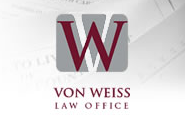
—
The author Brigitte von Weiss of VON WEISS LAW OFFICE is an estate planning and elder law attorney in Easton, MA. She is often asked about common estate planning errors.
A common estate planning error is failing to provide a trust for minor beneficiaries. Absent a trust for the inheritance of a minor, the court will appoint a conservator to hold, manage, and use the money for the benefit of the child or grandchild. A conservatorship of a minor child or grandchild is less than optimal for several reasons. First of all, the conservatorship process can be time consuming and costly and the cost is paid from the child or grandchild’s assets. Secondly, there are times when unfortunately an unsuitable person is appointed the conservator. For example, if your estate plan provides that your deceased daughter’s share goes to her minor children, the minor’s father (potentially your daughter’s irresponsible ex-spouse) may be the person who the court appoints as conservator. By far, however, the biggest disadvantage of a conservatorship is that the minor is entitled to the balance of his or her inheritance at age 18. It is well known that eighteen-year-olds often do not make wise choices. Arguably, there is no worse time to receive an inheritance as an inheritance at age 18 serves both as a temptation to spend irresponsibly and a distraction from attaining a higher education.
A trust for minors is far more optimal than a conservatorship. To begin with, if the trust contains the proper language, the funds are available for the minor’s health, education, maintenance and support. Second, a trust for minors allows one to choose who will manage the money. Third, using a trust for minors enables one to avoid the expense and the time-consuming nature of the conservatorship process and court supervision. The primary reason for using a trust, however, is that it allows one to determine the age at which the minor will receive the balance of his or her inheritance. Some clients choose age 25 whereas others decide on ages 30 or 35. The reason for using these older ages is to minimize the potential for wasteful spending of the inheritance.
As a closing note, do not overlook the importance of coordinating one’s estate plan and beneficiary designations. Notwithstanding the perfect provisions of a trust for minors, if one names a minor directly as a beneficiary of an asset, a conservatorship will be necessary
Nothing in this article should be considered legal advice as this is a complicated area of the law.
Release ID: 494270

